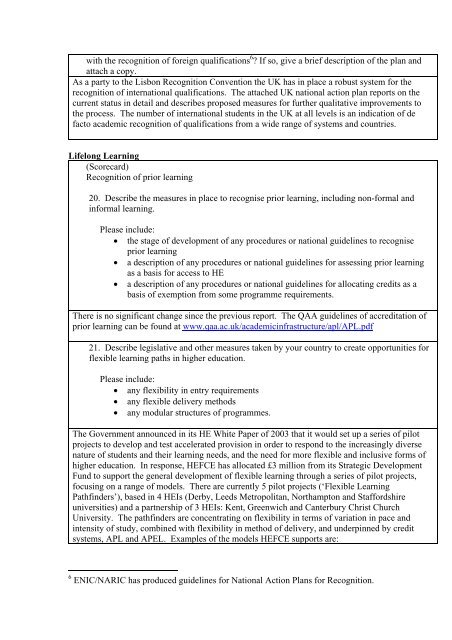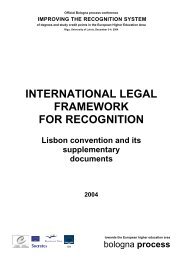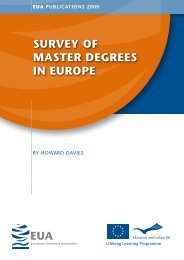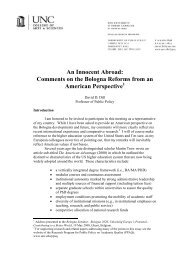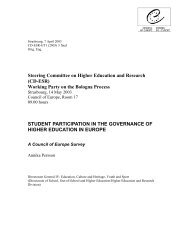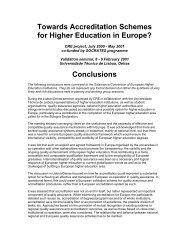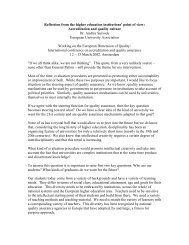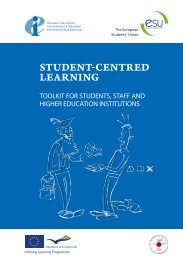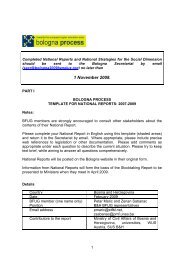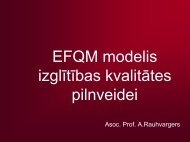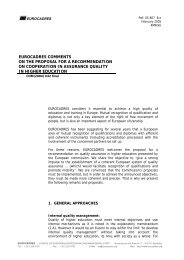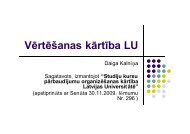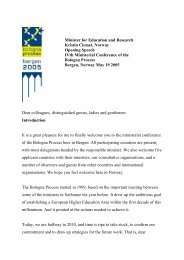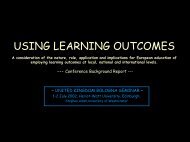BOLOGNA PROCESS - UK England, Wales & Northern Ireland
BOLOGNA PROCESS - UK England, Wales & Northern Ireland
BOLOGNA PROCESS - UK England, Wales & Northern Ireland
You also want an ePaper? Increase the reach of your titles
YUMPU automatically turns print PDFs into web optimized ePapers that Google loves.
with the recognition of foreign qualifications 6 ? If so, give a brief description of the plan andattach a copy.As a party to the Lisbon Recognition Convention the <strong>UK</strong> has in place a robust system for therecognition of international qualifications. The attached <strong>UK</strong> national action plan reports on thecurrent status in detail and describes proposed measures for further qualitative improvements tothe process. The number of international students in the <strong>UK</strong> at all levels is an indication of defacto academic recognition of qualifications from a wide range of systems and countries.Lifelong Learning(Scorecard)Recognition of prior learning20. Describe the measures in place to recognise prior learning, including non-formal andinformal learning.Please include:• the stage of development of any procedures or national guidelines to recogniseprior learning• a description of any procedures or national guidelines for assessing prior learningas a basis for access to HE• a description of any procedures or national guidelines for allocating credits as abasis of exemption from some programme requirements.There is no significant change since the previous report. The QAA guidelines of accreditation ofprior learning can be found at www.qaa.ac.uk/academicinfrastructure/apl/APL.pdf21. Describe legislative and other measures taken by your country to create opportunities forflexible learning paths in higher education.Please include:• any flexibility in entry requirements• any flexible delivery methods• any modular structures of programmes.The Government announced in its HE White Paper of 2003 that it would set up a series of pilotprojects to develop and test accelerated provision in order to respond to the increasingly diversenature of students and their learning needs, and the need for more flexible and inclusive forms ofhigher education. In response, HEFCE has allocated £3 million from its Strategic DevelopmentFund to support the general development of flexible learning through a series of pilot projects,focusing on a range of models. There are currently 5 pilot projects (‘Flexible LearningPathfinders’), based in 4 HEIs (Derby, Leeds Metropolitan, Northampton and Staffordshireuniversities) and a partnership of 3 HEIs: Kent, Greenwich and Canterbury Christ ChurchUniversity. The pathfinders are concentrating on flexibility in terms of variation in pace andintensity of study, combined with flexibility in method of delivery, and underpinned by creditsystems, APL and APEL. Examples of the models HEFCE supports are:6 ENIC/NARIC has produced guidelines for National Action Plans for Recognition.


